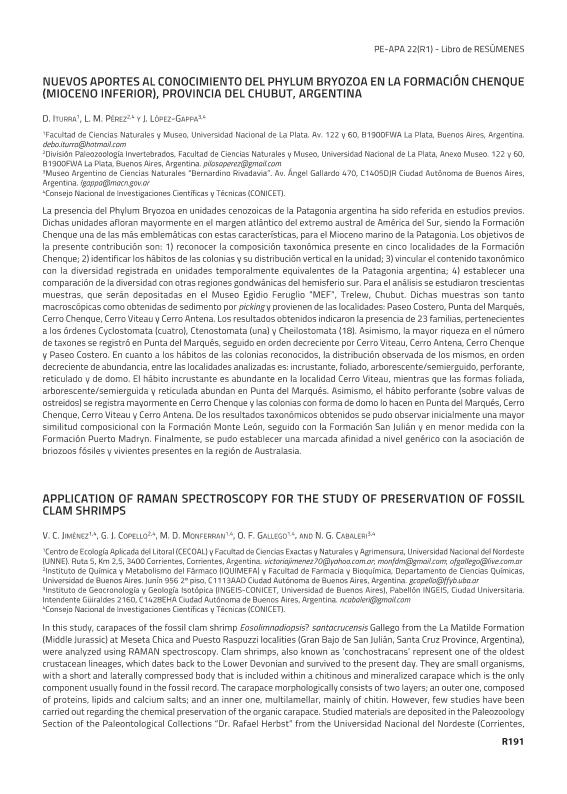Mostrar el registro sencillo del ítem
dc.contributor.author
Jiménez, Victoria Cecilia

dc.contributor.author
Copello, Guillermo Javier

dc.contributor.author
Monferran, Mateo Daniel

dc.contributor.author
Gallego, Oscar Florencio

dc.contributor.author
Cabaleri, Nora Graciela

dc.date.available
2023-08-25T11:32:41Z
dc.date.issued
2021
dc.identifier.citation
Application of raman spectroscopy for the study of preservation of fossil clam shrimps; XII Congreso de la Asociación Paleontológica Argentina; Buenos Aires; Argentina; 2021; 1-2
dc.identifier.issn
2469-0228
dc.identifier.uri
http://hdl.handle.net/11336/209332
dc.description.abstract
In this study, carapaces of the fossil clam shrimp Eosolimnadiopsis? santacrucensis Gallego from the La Matilde Formation (Middle Jurassic) at Meseta Chica and Puesto Raspuzzi localities (Gran Bajo de San Julián, Santa Cruz province, Argentina), were analyzed using RAMAN spectroscopy. Clam shrimps, also known as 'conchostracans' represent one of the oldest crustacean lineages, which dates back to the Lower Devonian and survived to the present day. They are small organisms, with a short and laterally compressed body that is included within a chitinous and mineralized carapace which is the only component usually found in the fossil record. The carapace morphologically consists of two layers; an outer one, composed of proteins, lipids and calcium salts; and an inner one, multilamellar, mainly of chitin. However, few studies have been carried out regarding the chemical preservation of the organic carapace. Studied materials are deposited in the Paleozoology Section of the Paleontological Collections ?Dr. Rafael Herbst? from the Universidad Nacional del Nordeste (Corrientes, Argentina) under the acronym CTES-PZ. The Raman spectra were obtained by the RAMAN Thermo-Fischer DXR microscope, the parameters used in the analyzes were: 780 nm diode laser, power of 10.0 mW with a slit aperture of 25 μm and exposure time of 70 s. The results of the studied samples from Meseta Chica locality, revealed different percentages of amorphous carbon, more ordered and disordered graphitic that is expressed in the G (~ 1600 cm-1) and D (~ 1360 cm-1) bands. For the G band, a center at 1600 +/- 10 was used and the settings fluctuated between 1600 and 1594 cm-1 and for the deconvolution of the D1 band, a center set at 1350 +/-10 was used and all ranged between 1353-1360 cm-1. A peak was also observed at 461.5 cm-1 which could be due to a phosphate. Moreover, the carapaces from Puesto Raspuzzi locality, also show a band at ~ 1347 cm-1 assigned to band D related to structural defects in carbonaceous materials, and a peak at ~ 1590 cm-1 assigned to band G of carbon was obtained. Therefore, the presence of carbonaceous material was determined in the carapace remains of both localities. This is related to the preservation of an aliphatic hydrocarbon component already observed in other fossil arthropods. The presence of the hydrocarbon in the studied clam shrimp remains is interpreted as the preservation of the degraded internal cuticle of the carapace, the result of an in-situ polymerization process that occurred both in Meseta Chica and Puesto Raspuzzi samples. The presence of carbonaceous remains in the analyzed localities thus suggests a high percentage of preservation of organic remains, mainly derived from carapace remains (chitin), indicating similar modes of preservation. This abstract takes an important step to clarify the modes of preservation of clam shrimp carapaces regarding their organic chemical composition.
dc.format
application/pdf
dc.language.iso
eng
dc.publisher
Asociación Paleontológica Argentina

dc.rights
info:eu-repo/semantics/openAccess
dc.rights.uri
https://creativecommons.org/licenses/by-nd/2.5/ar/
dc.subject
PRESERVATION OF FOSSIL
dc.subject
CLAM SHRIMPS
dc.subject
LA MATILDE FOMATION
dc.subject
JURASSIC
dc.subject
PATAGONIA
dc.subject.classification
Geoquímica y Geofísica

dc.subject.classification
Ciencias de la Tierra y relacionadas con el Medio Ambiente

dc.subject.classification
CIENCIAS NATURALES Y EXACTAS

dc.title
Application of raman spectroscopy for the study of preservation of fossil clam shrimps
dc.type
info:eu-repo/semantics/publishedVersion
dc.type
info:eu-repo/semantics/conferenceObject
dc.type
info:ar-repo/semantics/documento de conferencia
dc.date.updated
2022-09-21T15:12:13Z
dc.journal.volume
22
dc.journal.pagination
1-2
dc.journal.pais
Argentina

dc.journal.ciudad
Buenos Aires
dc.description.fil
Fil: Jiménez, Victoria Cecilia. Consejo Nacional de Investigaciones Científicas y Técnicas. Centro Científico Tecnológico Conicet - Nordeste. Centro de Ecología Aplicada del Litoral. Universidad Nacional del Nordeste. Centro de Ecología Aplicada del Litoral; Argentina
dc.description.fil
Fil: Copello, Guillermo Javier. Consejo Nacional de Investigaciones Científicas y Técnicas. Oficina de Coordinación Administrativa Houssay. Instituto de Química y Metabolismo del Fármaco. Universidad de Buenos Aires. Facultad de Farmacia y Bioquímica. Instituto de Química y Metabolismo del Fármaco; Argentina
dc.description.fil
Fil: Monferran, Mateo Daniel. Consejo Nacional de Investigaciones Científicas y Técnicas. Centro Científico Tecnológico Conicet - Nordeste. Centro de Ecología Aplicada del Litoral. Universidad Nacional del Nordeste. Centro de Ecología Aplicada del Litoral; Argentina
dc.description.fil
Fil: Gallego, Oscar Florencio. Consejo Nacional de Investigaciones Científicas y Técnicas. Centro Científico Tecnológico Conicet - Nordeste. Centro de Ecología Aplicada del Litoral. Universidad Nacional del Nordeste. Centro de Ecología Aplicada del Litoral; Argentina
dc.description.fil
Fil: Cabaleri, Nora Graciela. Consejo Nacional de Investigaciones Científicas y Técnicas. Oficina de Coordinación Administrativa Ciudad Universitaria. Instituto de Geocronología y Geología Isotópica. Universidad de Buenos Aires. Facultad de Ciencias Exactas y Naturales. Instituto de Geocronología y Geología Isotópica; Argentina
dc.relation.alternativeid
info:eu-repo/semantics/altIdentifier/url/https://www.peapaleontologica.org.ar/index.php/peapa/article/view/422
dc.conicet.rol
Autor

dc.conicet.rol
Autor

dc.conicet.rol
Autor

dc.conicet.rol
Autor

dc.conicet.rol
Autor

dc.coverage
Internacional
dc.type.subtype
Congreso
dc.description.nombreEvento
XII Congreso de la Asociación Paleontológica Argentina
dc.date.evento
2021-11-23
dc.description.ciudadEvento
Buenos Aires
dc.description.paisEvento
Argentina

dc.type.publicacion
Journal
dc.description.institucionOrganizadora
Asociación Paleontológica Argentina
dc.source.revista
Publicación Electrónica Asociación Paleontológica Argentina
dc.date.eventoHasta
2021-11-26
dc.type
Congreso
Archivos asociados
